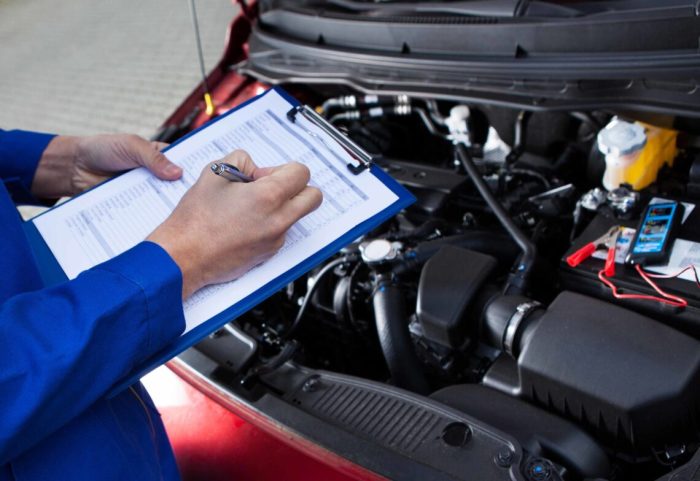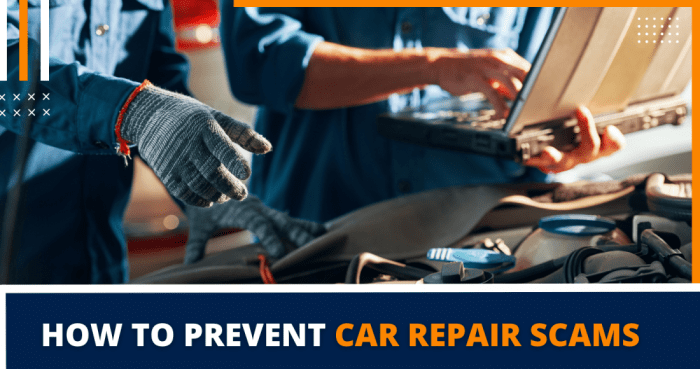How to avoid common car repair scams? It’s a question that plagues every car owner. With so many unscrupulous mechanics out there, it’s hard to know who to trust. But don’t worry, we’ve got you covered. In this comprehensive guide, we’ll share everything you need to know to avoid getting ripped off.
From understanding common scams to finding a reputable mechanic, we’ll cover it all. So whether you’re a seasoned pro or a first-time car owner, read on for the ultimate guide to avoiding car repair scams.
Understand Common Car Repair Scams
Becoming familiar with the deceptive practices employed by car repair shops is crucial to prevent falling victim to scams. These practices may include inflating repair costs, recommending unnecessary repairs, and using low-quality parts. Recognizing the red flags associated with these scams can help you safeguard yourself against them.
Deceptive Practices
- Overcharging:Unscrupulous repair shops may deliberately overcharge for parts and labor, taking advantage of customers who lack knowledge about car repair costs.
- Unnecessary Repairs:Some shops may recommend unnecessary repairs or services to increase their profits, even if your vehicle does not require them.
- Low-Quality Parts:To cut costs, some shops may use low-quality or counterfeit parts that compromise the safety and performance of your vehicle.
Red Flags
- Unusually High Estimates:If a repair estimate seems excessively high compared to other quotes, it may be a red flag.
- Pressure to Make a Decision:Legitimate repair shops will not pressure you to make an immediate decision. Beware of shops that insist on you approving repairs on the spot.
- Lack of Transparency:Reputable shops will provide clear explanations of the repairs needed and the costs involved. If a shop is evasive or refuses to answer your questions, it may be a sign of a scam.
Research and Find a Reputable Mechanic

Avoiding car repair scams requires finding a reputable mechanic. Conduct thorough research and read online reviews to assess the quality of service and customer satisfaction. Look for mechanics certified by reputable organizations and with experience in your vehicle’s make and model.
Online Research and Reviews
Online platforms like Google My Business, Yelp, and Facebook provide a wealth of information about mechanics. Read reviews from previous customers to gauge their experiences, ratings, and feedback. Pay attention to specific comments regarding professionalism, communication, and the quality of repairs.
Certifications and Experience
Certifications from organizations like the National Institute for Automotive Service Excellence (ASE) indicate a mechanic’s knowledge and skills. Look for mechanics who have specialized certifications relevant to your vehicle’s make and model. Additionally, consider their years of experience and the range of services they offer.
Building a Long-Term Relationship
Establishing a long-term relationship with a trusted mechanic can be beneficial. They will become familiar with your vehicle’s history, maintenance needs, and any potential issues. This familiarity enables them to provide personalized recommendations and prevent costly repairs in the future.
Get Multiple Estimates

Acquiring estimates from multiple mechanics is essential to ensure you’re getting a fair price and avoiding potential scams. By comparing estimates, you can identify inconsistencies, spot inflated charges, and make an informed decision about your repairs.
When comparing estimates, pay attention to the following:
Parts and Labor
- Verify that the parts being replaced are necessary and that the labor costs are reasonable.
- Compare the prices of parts across different estimates to ensure you’re not being overcharged.
Diagnostic Fees
- Check if there are diagnostic fees included and compare their costs between estimates.
- Some mechanics may waive diagnostic fees if you decide to have the repairs done at their shop.
Dealerships vs. Independent Mechanics
- Dealerships typically have higher labor rates but may offer genuine parts and specialized knowledge.
- Independent mechanics often have lower labor rates and can source parts from various suppliers.
- Consider the pros and cons of each option based on your specific needs and budget.
Ask for Detailed Explanations
Understanding the specifics of car repairs is crucial to avoid scams. Asking mechanics for detailed explanations helps you grasp the nature of the issue, identify potential red flags, and ensure transparency.
Understanding Repair Descriptions
Request a thorough breakdown of the repair process, including the components to be replaced, the labor involved, and the estimated time frame. This clarity allows you to comprehend the scope of work and assess if it aligns with your understanding of the problem.
Identifying Red Flags
Vague or overly technical explanations may indicate a lack of expertise or an attempt to conceal something. Be wary of terms like “general maintenance” or “routine inspection” without specific details. Also, watch out for inflated labor hours or excessive charges for parts.
Clear Communication
Open and honest communication is essential. If you don’t understand a particular aspect of the repair, ask for further clarification. Ensure you’re on the same page with the mechanic to avoid misunderstandings and potential disputes.
Be Present During Repairs

Being present during car repairs offers numerous advantages. It allows you to observe the mechanic’s work firsthand, ask questions, and ensure that the repairs are being done correctly. By being present, you can gain a better understanding of your car’s condition and the repairs being performed.
Observe the Mechanic’s Work
Observing the mechanic’s work can help you identify any potential problems or areas of concern. Pay attention to the tools and techniques being used, and don’t hesitate to ask questions if you see something that doesn’t seem right. By being actively involved in the repair process, you can ensure that the work is being done to your satisfaction.
Check Parts Before and After Replacement

Inspecting car parts before and after replacement is crucial to ensure the use of genuine and high-quality components. Counterfeit or used parts may compromise your vehicle’s performance, safety, and longevity.
Identifying Genuine Parts
* Check for manufacturer’s logos, part numbers, and packaging.
- Compare the part to the original to ensure it matches in size, shape, and material.
- Ask the mechanic to provide proof of authenticity, such as receipts or documentation.
Consequences of Using Low-Quality Parts, How to avoid common car repair scams?
* Poor performance and reduced efficiency
- Safety hazards due to faulty materials or design
- Increased wear and tear on other vehicle components
- Voiding of warranties and insurance coverage
Get Everything in Writing
In the automotive repair world, verbal agreements and promises can easily get lost in translation. To protect yourself from potential misunderstandings or scams, it’s crucial to get everything in writing.
When you take your car to a repair shop, make sure to obtain a written repair order that clearly Artikels the following:
Details of Repairs
- Description of the problem
- Specific repairs being performed
- Estimated cost of each repair
- Estimated completion date
Parts Information
- Brand and model of replacement parts
- Part numbers
- Warranty information
Labor Charges
- Hourly labor rate
- Estimated labor time
Additionally, ask for a written invoice once the repairs are complete. This should include all the details from the repair order, as well as the final cost and payment method.
Legal Implications
Written documentation serves as a legally binding record of the agreed-upon repairs and costs. It can protect you in case of disputes or misunderstandings. If a repair shop fails to honor its commitments or performs unauthorized repairs, having written records will strengthen your case.
Trust Your Instincts

Your gut feeling can be a valuable tool when dealing with mechanics. Learn to recognize the warning signs that may indicate a potential scam. Ignoring your instincts can lead to costly repairs and further inconvenience.
Red Flags
- Mechanics who pressure you into making a decision on the spot.
- Mechanics who are vague or evasive when explaining the problem.
- Mechanics who recommend unnecessary repairs or services.
- Mechanics who charge significantly more than other mechanics for the same service.
- Mechanics who refuse to provide a written estimate or guarantee.
Consequences of Ignoring Your Instincts
- You may end up paying for unnecessary repairs.
- Your car may not be repaired properly, leading to further problems.
- You may lose trust in mechanics and become hesitant to seek help when you need it.
Stay Informed and Educate Yourself: How To Avoid Common Car Repair Scams?
To effectively avoid car repair scams, it’s crucial to stay informed and expand your knowledge about car maintenance and repairs. This empowers you to make informed decisions, communicate effectively with mechanics, and identify potential red flags.
Reliable information is readily available online, in libraries, and through automotive organizations. Reputable sources include websites of car manufacturers, consumer protection agencies, and automotive industry publications.
Attend Workshops or Classes
Attending workshops or classes specifically designed for car maintenance and repair can significantly enhance your understanding. These sessions often provide hands-on experience, allowing you to develop practical skills and gain a deeper understanding of how your car operates.
Ending Remarks
There you have it, our comprehensive guide to avoiding common car repair scams. By following these tips, you can protect yourself from being taken advantage of and ensure that your car is getting the repairs it needs at a fair price.
Remember, knowledge is power. The more you know about car repair, the less likely you are to fall victim to a scam. So stay informed, be vigilant, and don’t be afraid to ask questions. With a little bit of effort, you can keep your car running smoothly and avoid the costly pitfalls of car repair scams.
FAQ Guide
How can I spot a car repair scam?
There are a few red flags to watch out for, such as mechanics who pressure you to make a decision on the spot, who recommend unnecessary repairs, or who use scare tactics to get you to spend more money.
How can I find a reputable mechanic?
Ask for recommendations from friends and family, read online reviews, and check with your local consumer protection agency. You can also look for mechanics who are certified by a reputable organization, such as the National Institute for Automotive Service Excellence (ASE).
What should I do if I think I’ve been scammed?
If you believe you’ve been the victim of a car repair scam, you should report it to your local consumer protection agency and the Better Business Bureau. You can also file a complaint with the state attorney general’s office.